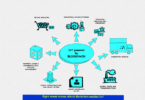Accenture has released a new proposal on the potentials of blockchain technology in the airline industry. The global consulting giant has outlined on how airlines can utilize the technology to change the way they do their business.
The release stated that the characteristics of the airline industry and also the travel industry as a whole, aligns well with the capabilities of the blockchain. The travel industry is powered by data sharing among multiple actors and touchpoints.
Each actor requires, collects, stores and often shares traveler and operational information and there is a web of complex and seemingly endless data reconciliation happening behind the scenes of every touchpoint. With this in the airline industry, not only the operational integrity and revenue generation are at stake, but also safety and security.
“Using blockchain technology for enhanced reconciliation and data sharing is a compelling value proposition for this industry. The most creative and disruptive possibilities go beyond pure financial transactions,” the analysis stated.
Blockchain can be used in ticketing, where it can tokenize the paper ticket and further dematerialize it. With the help of smart contracts associated with the asset, airlines can add business logic and terms and conditions around how the ticket is sold and used. Blockchain can be applied in loyalty, which is a big business in air travel. By tokenizing loyalty points on the blockchain, travelers can get instant value by redeeming them on the spot. They can also use them more broadly through a specific user community of partners.
Apart from these applications, blockchain can be applied in security and identity by protecting data privacy. Blockchain technology with a security wrapper creates a very different and less risky way of managing and sharing this information through the use of authorized access requirements. Blockchain also has potentials in transforming maintenance logs.
“Blockchain technology will continue to take flight in airlines over the next decade. Use cases not even conceived of today will become everyday, reducing complexity and costs while improving the travel journey with real-time travel experiences,” the analysis concluded.







